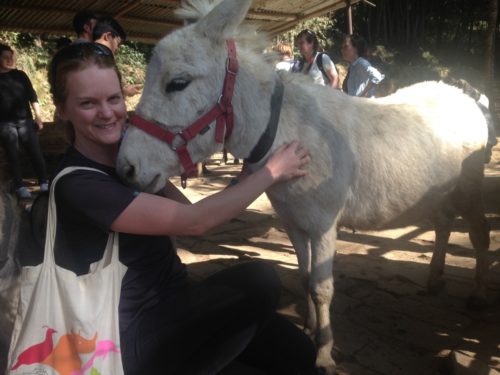
Tamzin is a social scientist with a background in global health, and has a specific interest in the interconnections between human and animal health and wellbeing. She completed a PhD at the University of Liverpool studying how we can improve the management of obesity in horses, particularly focusing on horse-human relationships and human behaviour change. She now works on projects covering a wide range of aspects of understanding human behaviour in order to improve companion animal welfare, and in using social sciences to find out more about how we can help people to change. Although Tamzin is a self-confessed horse-nut, she hopes to work with animals across the board in future, and has previously been involved with charities ranging from South-East Asian wildlife to British domestic pets, and particularly loves goats (well, who doesn’t).
A chat with Tamzin
Tell us a little bit about you and your journey into behaviour change in relation to improving the lives of animals?
Having worked in human global health for the first part of my career, I had a great interest in the power of communities of practice and social change – but I didn’t discover the wonder of behaviour change science properly until I started my PhD in animal welfare at the University of Liverpool. Although I’d transitioned from human welfare to animal welfare, it quickly became apparent that it was more important for me to understand the people than the animals – without focusing on what made the people tick, I’d never be able to help them to change their behaviour to improve the lives of the animals. My PhD studied one of the biggest welfare issues for UK equines; obesity. As a result of studying this from a human behaviour change perspective, we put in place initiatives such as creating a supportive decision making tool for owners to work out how to make changes for their horses, and “healthiest body condition” awards across UK shows.
Why does behaviour change matter?
I haven’t yet been able to find an animal welfare issue which can be improved without first altering human behaviour – and we know from the literature that just “telling” people what to do just doesn’t work. We need to understand how people change in order to improve life for our animals.
Most inspiring behaviour change intervention (animal welfare or other) and why?
One of my favourite behaviour change interventions is the HENRY project, which provides parenting support in Leeds (https://www.henry.org.uk/). This programme recognised that common child health problems such as obesity and dental problems could stem from parenting challenges, and set up an amazingly supportive programme for parents in this low socioeconomic area. Leeds is now one of the only areas of the UK where child obesity is actually declining, and HENRY is one of the interventions thought to have been relevant in making this change.
What’s your vision for behaviour change for the next five years?
Lots of organisations are now realising that behaviour change science is a useful thing, but there’s still some concern and confusion about how to apply it in practice, and it’s still sometimes an afterthought or “fringe science” to main animal welfare debates. I hope that behaviour change will become central to thinking about animal welfare challenges – and I also hope that we can find practical ways to monitor and evaluate initiatives for every project.
How did you become involved with Human Behaviour Change for Animals?
Early in my PhD I attended an HBCA workshop and everything fell into place – I thought “this is what I want to do!”. I was very lucky to attend future events and get to know the team, and then be invited to speak at the 2018 conference, and my involvement has continued from there.
Why do you like working with HBCA?
It’s so inspiring to be working with people who are so passionate and knowledgeable about their topics, and who can truly find ways to bring about the changes we all want to see.
Top tip for organisations getting started with behaviour change?
Don’t be afraid of models of change! People often seem to think models are a bit too complicated, but actually they can help us to think about behaviours in a much more holistic way, and thus find ways to bring about change.
Specialisms
- Problem evaluation
- Use of behaviour change models
- Designing behaviour change interventions
- Developing and sustaining communities of practice
Connect with Tamzin:
LinkedIn: https://www.linkedin.com/in/tamzin-furtado-phd-7b352230/
Twitter: @tamzinfurtado

